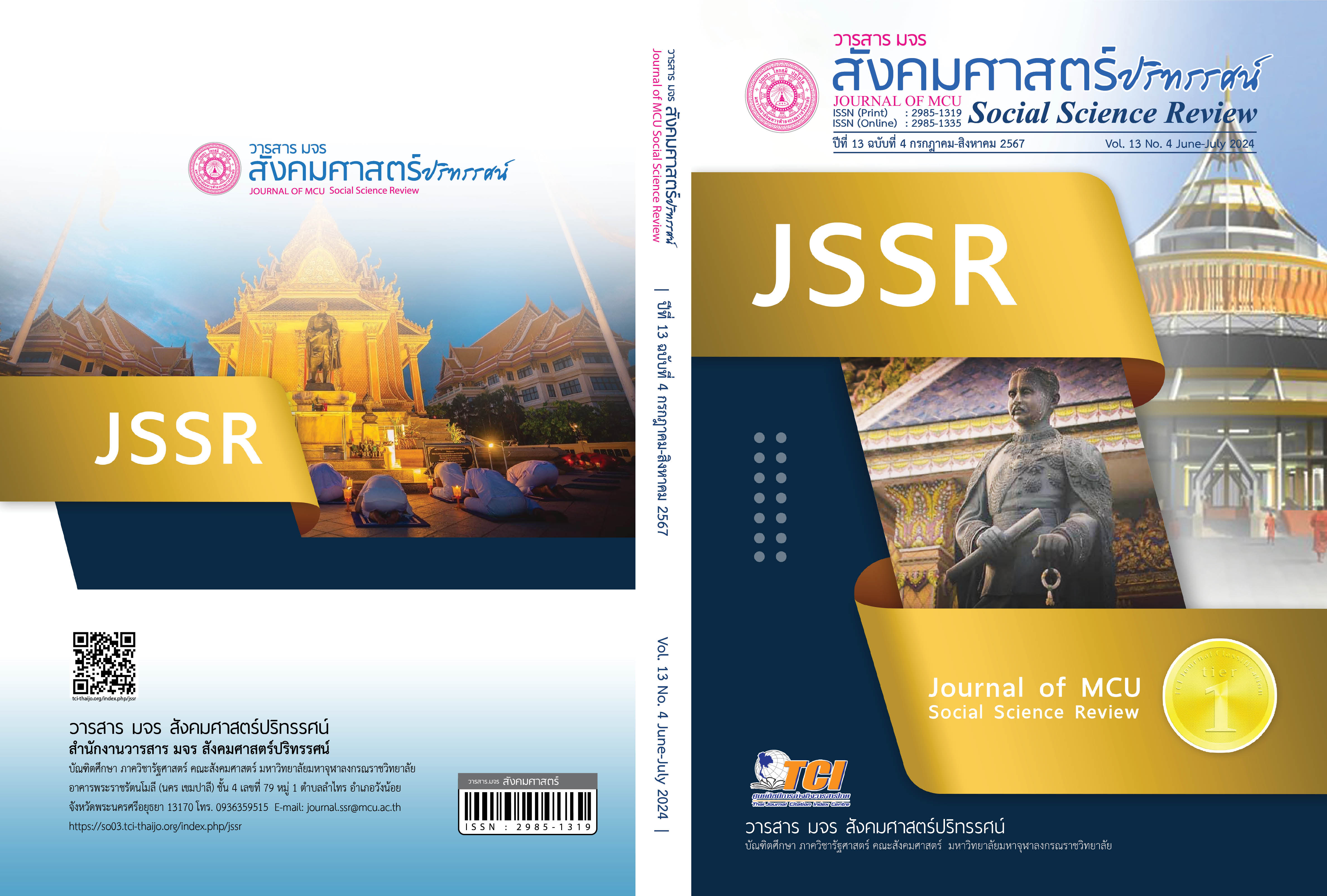อิทธิพลของการนิเทศภายในสถานศึกษาที่ส่งผลต่อสมรรถนะครูในการจัดการเรียนรู้เชิงรุกของสถานศึกษาขนาดเล็กในสังกัดสำนักงานเขตพื้นที่การศึกษามัธยมศึกษาฉะเชิงเทรา
คำสำคัญ:
อิทธิพลของการนิเทศภายในสถานศึกษา, สมรรถนะครู, การจัดการเรียนรู้เชิงรุก, สถานศึกษาขนาดเล็กบทคัดย่อ
บทความวิจัยนี้มีวัตถุประสงค์ 1. สภาพการนิเทศภายในสถานศึกษาด้านการจัดการเรียนรู้เชิงรุกของสถานศึกษาขนาดเล็ก 2. สมรรถนะครูในการจัดการเรียนรู้เชิงรุกของสถานศึกษาขนาดเล็ก 3. ความสัมพันธ์ระหว่างการนิเทศภายในสถานศึกษากับสมรรถนะครูในการจัดการเรียนรู้เชิงรุก 4. อิทธิพลของการนิเทศภายในสถานศึกษาด้านการจัดการเรียนรู้เชิงรุกมีผลต่อสมรรถนะครูในการจัดการเรียนรู้เชิงรุก เป็นการวิจัยเชิงปริมาณ ประชากร คือ หัวหน้ากลุ่มสาระการเรียนรู้หรือผู้แทน 8 กลุ่ม จำนวน 112 คน เครื่องมือที่ใช้เป็นแบบสอบถาม วิเคราะห์ข้อมูลโดยการแจกแจงความถี่ ร้อยละ ค่าเฉลี่ย ส่วนเบี่ยงเบนมาตรฐาน ค่าสัมประสิทธิ์สหสัมพันธ์แบบเพียร์สัน และการวิเคราะห์สมการถดถอยพหุคูณ
ผลการวิจัยพบว่า 1. ระดับปฏิบัติการนิเทศภายในสถานศึกษา ภาพรวมอยู่ในระดับมาก ด้านที่มีระดับปฏิบัติมากที่สุด คือ การปฏิบัติการนิเทศภายใน 2. ระดับสมรรถนะประจำสายงานของครู ภาพรวมอยู่ในระดับมาก ด้านที่ครูมีสมรรถนะมากที่สุด คือ ภาวะผู้นำครู 3. ความสัมพันธ์ระหว่างการนิเทศภายในสถานศึกษากับสมรรถนะประจำสายงานของครู มีความสัมพันธ์ทางบวกสูง มีค่าสัมประสิทธิ์สหสัมพันธ์เท่ากับ 0.862 อย่างมีนัยสำคัญทางสถิติที่ระดับ .05 4. การนิเทศภายในสถานศึกษาด้านการจัดการเรียนรู้เชิงรุกมีอำนาจการพยากรณ์สมรรถนะประจำสายงานของครูในการจัดการเรียนรู้เชิงรุก ร้อยละ 68 อย่างมีนัยสำคัญทางสถิติที่ระดับ .05
เอกสารอ้างอิง
กมล โพธิเย็น. (2564). Active Learning: การจัดการเรียนรู้ที่ตอบโจทย์การจัดการศึกษาในศตวรรษที่ 21. วารสารศึกษาศาสตร์ มหาวิทยาลัยศิลปากร, 19(1), 11-28
ชูศรี วงศ์รัตนะ. (2560). เทคนิคการใช้สถิติเพื่อการวิจัย (พิมพ์ครั้งที่ 13). กรุงเทพฯ: ศูนย์ หนังสือจุฬาลงกรณ์มหาวิทยาลัย.
ทวีศักดิ์ ยศถาการ. (2558). การพัฒนารูปแบบภาวะผู้นำการเรียนการสอนของหัวหน้ากลุ่ม สาระการเรียนรู้ในโรงเรียนมัธยมศึกษา สังกัดสำนักงานเขตพื้นที่การศึกษา มัธยมศึกษา เขต 1. วารสารราชภัฏสุราษฎร์ธานี, 2(1), 67-86.
นงลักษณ์ พิมพ์ศรี. (2559). การพัฒนาสมรรถนะประจำสายงานครูด้านภาวะผู้นำ. วารสารวิชาการ มหาวิทยาลัยราชภัฏบุรีรัมย์, 8(2), 91-104.
พฤหัส คงเทศ และอนุชา กอนพ่วง. (2562). รูปแบบการนิเทศภายในที่ส่งผลต่อสมรรถนะการจัดการเรียนรู้ของครูในโรงเรียนสังกัดสำนักงานเขตพื้นที่การศึกษาประถมศึกษา พิษณุโลก เขต 1. วารสารศึกษาศาสตร์ มหาวิทยาลัยนเรศวร, 21(2), 198-211.
เพ็ญประกาย สุขสังข์ และคณะ. (2563). สภาพและแนวทางการพัฒนาสมรรถนะประจำสายงานครูในสถานศึกษาขนาดเล็ก สังกัดสำนักงานเขตพื้นที่การศึกษาประถมศึกษาบุรีรัมย์ เขต 2. นครปฐม: มหาวิทยาลัยราชภัฏนครปฐม.
ภีชาวิชญ์ ยางงาม. (2564). กระบวนการนิเทศภายในโรงเรียนบรรหารแจ่มใสวิทยา 3 (วิทยานิพนธ์ศึกษาศาสตรมหาบัณฑิต สาขาวิชาการบริหารการศึกษา). นครปฐม: มหาวิทยาลัยศิลปากร.
ยุภาลัย มะลิซ้อน. (2563). การพัฒนาสมรรถนะครูด้านการจัดการเรียนรู้เชิงรุกในสถานศึกษา สังกัดสำนักงานเขตพื้นที่การศึกษาประถมศึกษามหาสารคาม เขต 2. วารสารมหาจุฬานาครทรรศน์, 7(8), 230-243.
ราณี กุยรัมย์. (2553). ปัญหาและแนวทางการนิเทศภายในโรงเรียนขนาดเล็กสังกัดสำนักงานเขตพื้นที่การศึกษาบุรีรัมย์เขต 2 (วิทยานิพนธ์ครุศาสตรมหาบัณฑิต สาขาวิชาการบริหารการศึกษา). บุรีรัมย์: มหาวิทยาลัยราชภัฏบุรีรัมย์.
วิจารณ์ พานิช. (2558). วิถีสร้างการเรียนรู้เพื่อศิษย์ในศตวรรษที่ 21. วารสารนวัตกรรมการ เรียนรู้, 1(2), 3-14.
วัชรา เล่าเรียนดี. (2556). ศาสตร์การนิเทศการสอนและการโค้ช การพัฒนาวิชาชีพ : ทฤษฎีกลยุทธ์สู่การปฏิบัติ (พิมพ์ครั้งที่ 12). นครปฐม: มหาวิทยาลัยศิลปากร.
วัฒนาพร ระงับทุกข์. 2563. สมรรถนะเด็กไทยในยุคโลกพลิกผัน (VUCA World). วารสารคุรุสภาวิทยาจารย์, 1(1), 8-18.
สาวิณีย์ เอี่ยมสะอาด และธีระวัฒน์ มอนไธสง. (2565). รูปแบบการนิเทศภายในที่ส่งผลต่อสมรรถนะประจำสายงานของครูในสถานศึกษา สังกัดสำนักงานเขตพื้นที่การศึกษา มัธยมศึกษาสิงห์บุรี อ่างทอง. วารสารการบริหารนิติบุคคลและนวัตกรรมท้องถิ่น, 8(6), 223-236.
สถาบันวิจัยเพื่อการพัฒนาประเทศไทย. (2558). แนวทางการแก้ปัญหาโรงเรียนขนาดเล็ก. สืบค้น 12 กรกฎาคม 2565, จาก https://tdri.or.th/2015/07/wb113/
สำนักงานเขตพื้นที่การศึกษามัธยมศึกษาฉะเชิงเทรา. (2565). ข้อมูลสารสนเทศทางการศึกษา ปีการศึกษา 2565. ฉะเชิงเทรา: กลุ่มส่งเสริมการศึกษาทางไกล เทคโนโลยีสารสนเทศ และการสื่อสาร.
สำนักงานคณะกรรมการการศึกษาขั้นพื้นฐาน. (2553). คู่มือประเมินสมรรถนะครู. กรุงเทพฯ: กระทรวงศึกษาธิการ.
สำนักงานเลขาธิการสภาการศึกษา. (2561). รายงานการศึกษาไทย พ.ศ. 2561. กรุงเทพฯ: พริกหวานกราฟฟิค.
หน่วยศึกษานิเทศก์. (2562). แนวทางการนิเทศบูรณาการโดยใช้พื้นที่เป็นฐานเพื่อพัฒนาคุณภาพการศึกษาสู่การนิเทศภายในโรงเรียนโดยใช้ห้องเรียนเป็นฐานเพื่อการพัฒนาคุณภาพของผู้เรียน 2562 ปีทองแห่งการนิเทศภายในห้องเรียนเป็นฐานเพื่อการพัฒนาคุณภาพของผู้เรียน. กรุงเทพฯ: สำนักงานคณะกรรมการการศึกษาขั้นพื้นฐาน.
Best, J. W. & Kahn, J. V. (1993). Research in Education (7th. ed.). Boston: Allyn & Bacon.
Ismail, S. N. et al. (2018). Instructional Leadership and Teachers’ Functional Competency across the 21st Century Learning. International Journal of Instruction, 11(3), 135-152.
Nguyen, T. T. H. & Sirinat, J. (2018). 1st Century Learning 21 of High School Students in Gluebang Province, Vietnam. Journal Research Khon Kaen University (Graduate Study) Department of Humanities and Social Sciences, 6(2), 14-24.
ดาวน์โหลด
เผยแพร่แล้ว
รูปแบบการอ้างอิง
ฉบับ
ประเภทบทความ
สัญญาอนุญาต
ลิขสิทธิ์ (c) 2024 วารสาร มจร สังคมศาสตร์ปริทรรศน์

อนุญาตภายใต้เงื่อนไข Creative Commons Attribution-NonCommercial-NoDerivatives 4.0 International License.
เพื่อให้เป็นไปตามกฎหมายลิขสิทธิ์ ผู้นิพนธ์ทุกท่านต้องลงลายมือชื่อในแบบฟอร์มใบมอบลิขสิทธิ์บทความให้แก่วารสารฯ พร้อมกับบทความต้นฉบับที่ได้แก้ไขครั้งสุดท้าย นอกจากนี้ ผู้นิพนธ์ทุกท่านต้องยืนยันว่าบทความต้นฉบับที่ส่งมาตีพิมพ์นั้น ได้ส่งมาตีพิมพ์เฉพาะในวารสาร มจร สังคมศาสตร์ปริทรรศน์ เพียงแห่งเดียวเท่านั้น หากมีการใช้ภาพหรือตารางหรือเนื้อหาอื่นๆ ของผู้นิพนธ์อื่นที่ปรากฏในสิ่งตีพิมพ์อื่นมาแล้ว ผู้นิพนธ์ต้องขออนุญาตเจ้าของลิขสิทธิ์ก่อน พร้อมทั้งแสดงหนังสือที่ได้รับการยินยอมต่อบรรณาธิการ ก่อนที่บทความจะได้รับการตีพิมพ์ หากไม่เป็นไปตามข้อกำหนดเบื้องต้น ทางวารสารจะถอดบทความของท่านออกโดยไม่มีข้อยกเว้นใดๆ ทั้งสิ้น





